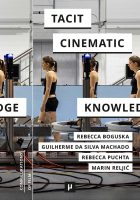- Language english
- Publishing Year 2023
- Series Configurations of Film Series
-
ISBNs:
- 978-3-95796-043-6 (print)
- 978-3-95796-044-3 (PDF)
- DOI:
- 10.14619/0436
- Available as Print, PDF
- License:
- CC BY-SA 4.0
- Download:
- COVER (JPG)
Post-Cinematic Bodies
How is human embodiment transformed in an age of algorithms? How do post-cinematic media technologies such as AI, VR, and robotics target and re-shape our bodies? Post-Cinematic Bodies grapples with these questions by attending both to mundane devices—such as smartphones, networked exercise machines, and smart watches and other wearables equipped with heartrate sensors—as well as to new media artworks that rework such equipment to reveal to us the ways that our fleshly existences are increasingly up for grabs. Through an equally philosophical and interpretive analysis, the book aims to develop a new aesthetics of embodied experience that is attuned to a new age of predictive technology and metabolic capitalism.
Endorsements
We have long been feeling how the type of embodied identification suggested by the Hollywood classics was in a process of dissolution. Thanks to a sophisticated mediation between the phenomenology of perception and theories of digital media, Shane Denson provides us with concepts and a first understanding of this transition and its far-reaching existential consequences.
—Hans Ulrich Gumbrecht, Stanford University
What if digital media changed not only traditional forms of communication, but also our very bodies, because of the way they address us? In this brilliant study, Shane Denson suggests that, from a phenomenological perspective, our bodies are always at the forefront of our mediation with the world; digital media involve our sensorium in an unprecedented way and this commitment represents their true “revolution.” A myriad of examples, including screens in gyms aimed at enhancing our exercises, are proof of this. Philosophically dense, analytically sharp, this book unearths what lies beneath our digital experiences.
—Francesco Casetti, Yale University
Refusing both the perfunctory valorization of the body as site of resistive potentiality and the diametric reflex to dismiss theories of embodiment as exercises in the foreclosure of criticality, Shane Denson advances a rigorous theory of mediated corporeality within the metabolic life of post-cinema, with profound implications for the politics of (counter-)capture across microtemporalities and planetary scales.
—Rizvana Bradley, University of California, Berkeley










